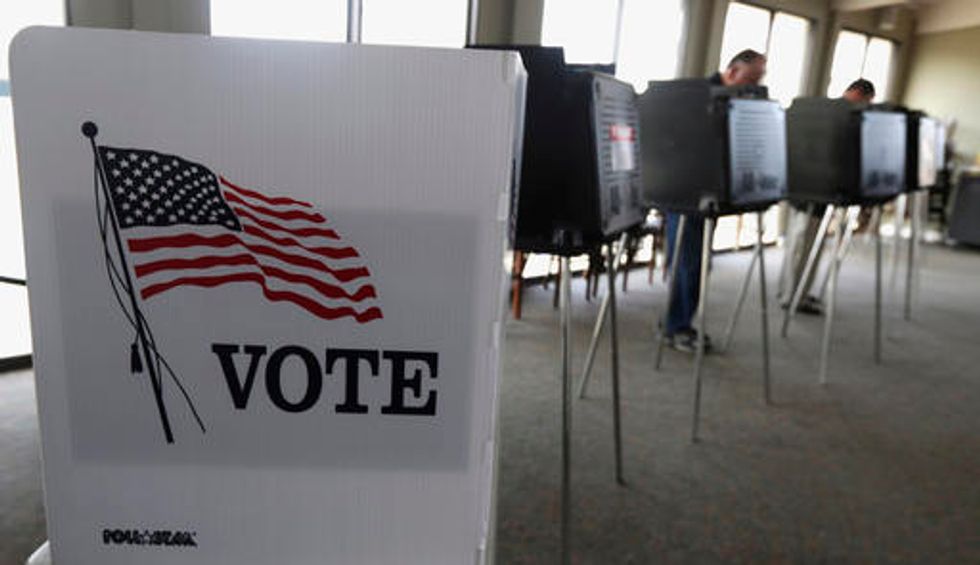
AP Photo/M. Spencer Green, File

Earlier this week on my radio show I spoke with fellow millennial and popular blogger “Liberty” Laura Meyers. We were discussing the overwhelming frustration our generation has been feeling throughout this election.
After going over the laundry list of concerns we both had with Donald Trump we moved onto Hillary Clinton and even the thought of her voice grated both of our nerves. Meyers characterized Clinton as "that evil grandmother" you just can’t stand to be around.
Certainly Clinton’s voice was just the tip of the iceberg when it came to our problems with the former Secretary of State, but we each agreed, these two major party candidates do not by whole or in part represent us, nor would we vote for them.
We’re in good company too, since a big portion of the millennial demo feel the same way. According to recent Public Policy Polling results, 63 percent of 18 to 29-year-olds had an unfavorable view of Trump, while 40 percent held an unfavorable opinion of Clinton.

Those stats leave a lot of votes to be casted with no major party candidate for them to go too. Which is why Meyers and I began to explore third party possibilities and how a vote cast for such a candidate might matter.
Meyers, an outspoken supporter of the Libertarian party, made her pitch for that party’s ticket of Gov. Gary Johnson and Gov. Bill Weld, as expected. She admitted they aren’t perfect or ideal in many ways, but they are far better than the other two options.
However, it was her follow-up to that that really piqued my interest.
She mentioned that there is more of a pressing reason than ever to vote the Libertarian ticket this election, because if they were to receive enough of the popular vote, they would essentially be given far more access, exposure and matching campaign funds the next go around, which would reinforce the Libertarian party as a solid competitor.
What Meyers was talking about was the vote share threshold established by the Federal Election Commission that dictates that in order to be officially recognized as a minor party, a ticket must receive at least five percent of the popular vote, regardless of the electoral college.
If such a thing were to occur, the Libertarian party ticket in 2020 would qualify for public matching funds—which would potentially be millions more than they have had to campaign on during this election cycle. Of course, the definitive number of funds it would amount too would be based on how big the popular vote came to be.
“If you want to see someone else become a viable candidate so that they can reach more people and get on the debate stage as well, vote a third party,” Meyers told me, even suggesting the possibility of the Green Party’s Jill Stein or the Constitution Party’s Darrell Castle as an option for this threshold as well.
The more I dug through the FEC requirements the more I realized that Meyers was right; if a third party was organized enough, the little known FEC mandate could in fact be a total game changer come the next run for the White House.
Turning our attention back to the two major parties, Meyers and I discussed the alarming rate in which millennials are abandoning ship on both sides and how so much damage has been done to the GOP and Democratic brands by way of their nominees this election.
Millennials are now the largest voting bloc in the United States and to act as though they will somehow have political amnesia following this election and fall back in line with parties as usual is, at best, foolish to assume. In fact, a recent Quinnipiac University poll found 60 percent of millennials said they’d consider voting third-party this election as it is.
The GOP and Democratic parties as we know them are on life support. Millennials will not come to the aid of something we know is cancerous to begin with. We will undoubtedly be looking for other options following this embarrassment of a campaign season.
There is no reasoned way for us to buy into major party values when both parties have become corrupted and the biggest problem themselves.
So when our parents, relatives and friends tell us that a voting third-party is essentially throwing away our vote, we can rest easy knowing that a vote for a third-party is a vote to recognize and elevate a solution rather than feeding the current problem.
But don't take my word for it, take it from Meyers who said, “That’s a pretty legitimate excuse to vote third-party.”
Wade Heath is Host of The Millennial Report Radio & Digital TV Show. Contact Him: WadeTheBlaze@Gmail.com
–
TheBlaze contributor channel supports an open discourse on a range of views. The opinions expressed in this channel are solely those of each individual author.